New Training Resources on Caring for Children With Trachs
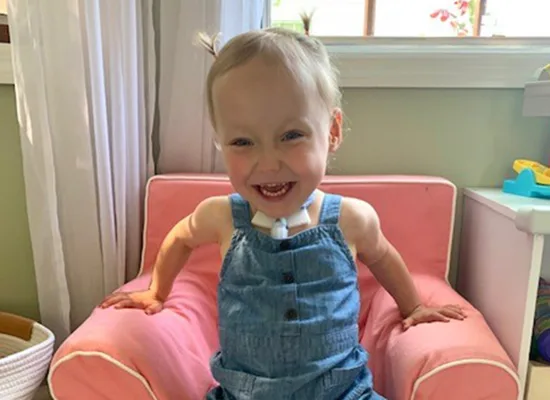
A new video and an updated free online course are available to help support the care of children with tracheostomy tubes
Parents and caregivers have a lot to learn when their child needs a tracheostomy (trach) tube to breathe.
Our Division of Specialized Care for Children (DSCC) team is here to support and guide families through learning how to care for their children’s complex medical needs.
We’ve gathered two new training resources to help families understand trach care.
Lurie Children’s Hospital Video on How to Handle Trach Emergencies
When emergency situations occur, it’s very important to keep the child’s trach tube open and in place.
Ann and Robert H. Lurie Children’s Hospital of Chicago has developed a video to help parents, caregivers and others know how to handle emergency situations with pediatric trach patients.
In this video, Lurie nurses explain:
- How to prevent and assess emergency situations
- How to manage a mucous plug
- How to replace a trach tube that has become dislodged
- What to do if the trach tube is difficult to replace
- When to provide manual ventilation using bag to trach tube, bag and mask to mouth, and mouth to mouth
We encourage our participant families in the Home Care Program to watch this video. Many of the children and youth in the Home Care Program rely on trachs and ventilators to breathe.
Please note that watching this video alone is not enough training to safely care for a child with a trach. Families should speak with their child’s doctors and care team about any questions or training needs.
For more information on how to safely care for a trach tube, you can visit Lurie’s Tracheostomy Care at Home webpage.
Free eHomeCare Course on How to Care for Children With A Trach
An updated free online course is available on how to care for children with trachs with or without a ventilator.
The eHomeCare program training is for:
- Nurses working in home-based environments
- Physicians
- Respiratory therapists
- Family members and caregivers of children with trachs with and without ventilators
- Students from health professions
The course is available until Sept. 30, 2026.
Learners can use this course for initial training, an annual review or as an ongoing resource.
The course learning objectives are:
- Describe best practices for providing day-to-day care for children with trachs with or without ventilators in the community
- Explain how to manage emergency situations for children with trachs with or without ventilators in the community
- Report an increase in confidence when caring for children with trachs with or without ventilators in the community
- Describe the roles and responsibilities of members of the healthcare team.
Free continuing education credits are available.
If you have trouble enrolling in the course or need help, please email help@icep.wisc.edu.
Again, please note that families should speak with their child’s doctors and care team about any questions or training needs for their child with a trach.
Our participant families can also contact their DSCC Care Coordinator with questions.
Important Reminders: End of Public Health Emergency and Return to In-Person Visits
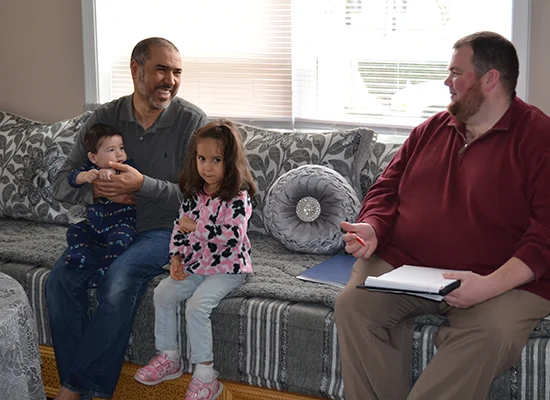
An overview of key changes affecting all Division of Specialized Care for Children participants now that the public health emergency is over
The public health emergency due to the COVID-19 pandemic ended on May 11, 2023.
This ending brings a variety of changes for our Division of Specialized Care for Children (DSCC) participant families. These changes include a return to in-person visits from DSCC Care Coordinators, an end to verbal signatures and more.
The following sections give an overview of key points and important dates to remember:
- Reminders for All DSCC Program Participants
- Reminders for Home Care Program Participants
- Important Medicaid/Insurance Updates for All DSCC Participants in Medicaid
- Contact Reminders for All DSCC Program Participants
Reminders for All DSCC Program Participants
Return to In-Person Visits
Meeting in person with our participants and families is an important part of care coordination. The public health emergency allowed face-to-face visits to occur virtually. Now that the public health emergency has ended, we must return to face-to-face meetings with our participants.
Your DSCC Care Coordinator will work with you in advance to schedule your next in-person/home visit. We understand that in-person visits with your Care Coordinator may be a change for you and your family. We paused these visits for several years during the public health emergency (though many families continued to meet with their Care Coordinator during the pandemic).
Seeing you in person helps us get to know you and your family better. It can also help improve your connection with your DSCC Care Coordinator. Our partnership with Medicaid and Medicaid managed care plans also requires us to meet with you in person. If you have any concerns about in-person visits, please talk to your Care Coordinator. We will work with you to see how to best accommodate your preferences.
Verbal Signatures
The public health emergency allowed your Care Coordinator to receive necessary signatures verbally. As of May 11, 2023, it is a federal rule that DSCC can no longer accept verbal signatures.
- Electronic signature options (such as through Adobe) remain an option for families when signing DSCC documents.
Reminders for Home Care Program Participants
End of Continued Medicaid and Program Enrollment for Those Found Ineligibile for Services
Starting April 1, 2023, DSCC began working with the Illinois Department of Healthcare and Family Services (HFS) to reassess all Home Care Program participants who received a notice of ineligibility for the program since March 1, 2020. Now that the public health emergency has ended, HFS’ notices accurately list the approved level of services for you or your child.
- If you or your child received a notice of ineligibility for services since March 1, 2020, your services will remain in place until HFS completes a reassessment. The reassessment looks at your updated and current medical documentation and will occur before Sept. 30, 2023.
- If you or your child received a notice of reduced nursing hours since March 1, 2020, your Care Coordinator will complete the next reassessment of services at your regularly scheduled renewal time. Services will remain in place until this reassessment occurs.
Reminders for Individuals in the Non-Waiver Program (Nursing and Personal Care Services)
Now that the public health emergency has ended, all individuals who turn 21 and are not on the Home and Community-Based Services Waiver for Those Who Are Medically Fragile Technology Dependent (MFTD), will not be eligible for services. If you or your child were on non-waiver services and turned 21 between the dates of March 1, 2020, and March 31, 2023, services will end on Sept. 30, 2023. Your Care Coordinator will work with you to ensure you or your child is set with an alternate state waiver, such as the Division of Rehabilitative Services (DRS), if applicable.
For all non-waiver participants under age 21, you must continue to have Medicaid coverage to receive Home Care services. It is important that you submit the redetermination form from Medicaid to keep your coverage. If you fail to meet Medicaid eligibility or do not respond in time, HFS will cancel your Medicaid case. Your Home Care services will then also end.
Additional COVID-19 Respite Allotment
During the public health emergency, HFS approved an additional 336 hours of respite to use before the regular respite allotment. This additional respite is for all Home Care MFTD waiver participants. Starting Nov. 11, 2023, this additional COVID respite will expire. All respite used after Nov. 11, 2023, will come from the standard respite allotment.
Personal Protective Equipment (PPE)
During the public health emergency, nursing agencies were reimbursed for PPE when actively staffing nurses in the home. The PPE is for the nurses to use while caring for participants. This reimbursement of PPE supplies to the nursing agencies will end on Nov. 11, 2023.
Nursing Supervisory Visits
Nursing agencies resumed in-person supervisory visits in November 2020. Effective May 11, 2023, there can be no exceptions to replace in-person supervisory visits.
Important Medicaid/Insurance Updates for All DSCC Participants in Medicaid
These next sections explain important Medicaid updates now that the public health emergency and continuous Medicaid coverage period has ended. The end of the public health emergency may also affect your Medicaid coverage or your private health insurance coverage.
No More Copays or Premiums for Medicaid
Most Medicaid programs no longer have premiums or copays. All Kids Assist, Aid to the Aged Blind and Disabled (AABD) and Adult Medicaid do not have monthly premiums or copays for services. All Kids Premium 1, Premium 2 and Share programs are all called All Kids Assist now.
Medical Redetermination for Medicaid
Redetermination is when Medicaid looks to see if you are still eligible. They look at your residency, monthly income and other criteria to decide if you still qualify.
Medicaid sent forms to some members as early as May 2023. They will not complete redetermination on all cases at the same time. They will make the redeterminations over several months. This means that your Medicaid redetermination could happen now or later, even next year. It is important to make sure Medicaid has your current address. You can report your address online at Medicaid.illinois.gov or call (877) 805-5312. We also have a news post with more details about how to update your address.
Please watch your mail for letters from Medicaid.
Once you receive your redetermination notice, you will have about a month to respond. Medicaid may ask for more information about your income, residency or other information. If Medicaid asks for more information and you do not respond, your Medicaid coverage ends. You can return the redetermination in several ways:
- Online at ABE.illinois.gov using Manage My Case. Manage My Case is the quickest way to complete your redetermination.
- By mail.
- In person at a local Illinois Department of Human Services (DHS) Family Community Resource Center.
- By phone.
If you are in a Medicaid managed care plan (MCO), please remember the MCO does not do the redetermination. Medicaid does redetermination reviews. If you do not qualify for Medicaid anymore, your coverage ends. If you are still eligible, you keep your Medicaid coverage.
Don’t risk losing your health insurance. Please update your address with Illinois Medicaid. It’s easy, fast and free:
- Call (877) 805-5312 from 7:45 a.m. to 4:30 p.m., Monday through Friday.
- Visit medicaid.illinois.gov.
- If you use a TTY, call (877) 204-1012.
Please contact your DSCC Care Coordinator if you have questions about Medicaid redetermination.
Telehealth Coverage
Telehealth coverage for Medicaid (and other insurances) is a permanent change and will continue after the public health emergency to give Medicaid time to review for any future changes. You can review the HFS Provider Notice issued May 9, 2023, on Telehealth to learn more.
An Illinois law signed in 2021 requires insurance to cover telehealth through 2027. This law does not require that practitioners or providers offer telehealth services. Therefore, your providers may not offer telehealth care. The law only says that insurance must pay providers for telehealth care if they provide it.
Pharmacy Billing and Prior Approval Requirements
Pharmacy billing and prior approval requirements for Medicaid will resume. There were many flexibilities that allowed Medicaid members to get medications. These include overriding the refill too soon and waiving requirements for the preferred drug list, quantity and brand limits. If you go to the pharmacy and they tell you that you can’t get your medications, ask your doctor to submit a prior approval to Medicaid. You can review the HFS Provider Notice issued May 3, 2023, on Pharmacy Billing to learn more. Contact your DSCC Care Coordinator for more help.
DME and Therapy Prior Approval Requirements
DME and therapy prior approval requirements for Medicaid will resume. There are some services that Medicaid did not require a prior approval for during the public health emergency. These services include therapy, home health and some durable medical equipment (DME). It is important for your providers to get a prior approval so that Medicaid reviews medical eligibility for the services. You can review the HFS Provider Notice issued April 4, 2023, on Prior Approval Requirements for more details. Contact your DSCC Care Coordinator for more help.
COVID-19 Tests, Treatment, and Vaccines
Uninsured individuals will no longer get access to special COVID-19 Medicaid eligibility which included testing, services, treatment, and vaccine administration during the public health emergency. You can view the HFS Provider Notice issued May 9, 2023, on Uninsured Population Special COVID-19 Coverage. Medicaid members who do have eligibility will continue to be able to access treatment, testing and vaccines.
Those with private insurance should also be able to continue to access treatment and vaccines as outlined by their plan.
Insurance plans will no longer cover over-the-counter tests for COVID-19 for free. Generally, a doctor will need to order the test and provide them in an office or similar facility. This may vary from plan to plan. You should call your insurance plan if you have questions. There may also be community organizations or public health departments still distributing COVID-19 tests and related services, such as vaccines, for free.
Extension of COBRA
During the public health emergency, there was an extension of election and notice deadlines for someone to take COBRA after losing or leaving a job. That will expire 60 days after May 11, 2023.
Temporary Special Enrollment Period
For individuals who no longer qualify for Medicaid after they go through redetermination, there is a special open enrollment period through the federal health insurance marketplace to purchase private insurance. It will extend from March 31, 2023, to July 31, 2024. This is only for people with a special qualifying event, such as losing coverage. Otherwise, the regular open enrollment period will be in November and December for individuals who need to enroll in private insurance through the marketplace. The Illinois website is GetCovered.illinois.gov and the federal website is HealthCare.gov.
Questions? Contact Us!
As a DSCC participant family, you can contact us with any questions or support your family needs.
Please note the best way to reach your care coordination team or any DSCC office is through our toll-free number of (800) 322-3722.
You can use this number to dial your Care Coordinator’s direct extension or to have our Customer Service Representatives connect you with the right person/team.
We have updated our phone system and ask everyone to use the (800) 322-3722 number as the simplest and fastest way to reach us.
Our office hours are 8 a.m. to 4:30 p.m. Please talk to your Care Coordinator if you have a need to speak outside of business hours.
You may also reach us through our general dscc@uic.edu inbox or use our Contact Us or Request a Callback forms on our website.
Please talk with your Care Coordinator if you have more questions or need to update your communication preferences.
We are thankful for your partnership throughout the changes related to the end of the pandemic and public health emergency. Our team will continue to help support your family and connect you with the right services and resources.
2023 Summer Camp Opportunities for All Ages and Abilities

Check out our list of inclusive camps to help you find the right fit for your child
It’s never too early to start planning for summer break activities.
Fortunately, there are a variety of opportunities for children and young adults with special healthcare needs.
We’ve compiled a list of day and overnight camps across Illinois as well as virtual programs.
Does your child want to make new friends? Develop new skills? Meet others with their condition or become more independent?
Our 2023 summer camp list can help you find the right fit.
These camps are accessible and inclusive for a variety of needs, including many of our program’s eligible medical conditions.
Our events calendar shows the summer camps listed by date. You may also search for events in your area by clicking on a regional office near you.
Know of a good summer camp opportunity to add to our list?
Send us the details at dscc@uic.edu. We’ll continue to update our list of camps and activities, so please check back often.
Permanent Home Care Program Changes Give Families More Flexibility and Support
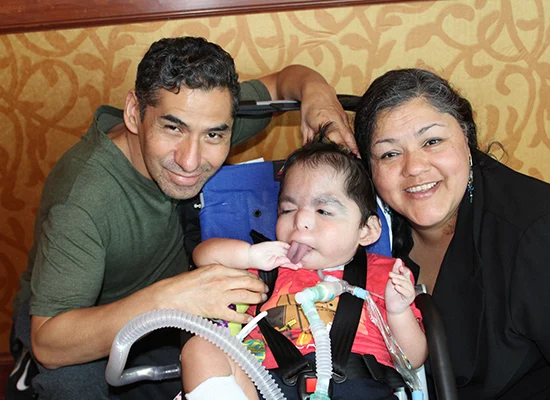
Paid licensed caregivers and nurse overtime are now permanent options for Home Care families
We have exciting news about long-term changes to the Home Care Program. We have listened to our participant families and made two pandemic-related benefits permanent. These changes can provide continued flexibility and support beyond the public health emergency.
When the COVID-19 pandemic began in March 2020, UIC’s Division of Specialized Care for Children (DSCC) partnered with the Illinois Department of Healthcare and Family Services (HFS) to address our Home Care families’ needs. Together, we set provisions included in Appendix K. Appendix K is an emergency coverage document for individuals receiving services through a Medicaid waiver.
We continued to partner with HFS to make two provisions permanent for Home Care participants. As a result, nurses can continue to provide overtime. Licensed parents/legally responsible adults (LRAs) can also remain paid nurse caregivers for their children enrolled in Home Care.
Below are more information and guidelines on these new permanent changes.
Licensed (RN or LPN) Parent/LRA Paid Caregivers
Parents or LRAs, including foster parents, can provide skilled nursing services to their children if they hold an active registered nurse (RN) or licensed practical nurse (LPN) license.
This approval includes participants enrolled in medically fragile, technology-dependent (MFTD) waiver services and non-waiver services. This approval is for all children approved for Home Care services, regardless of the child’s age.
Guidelines include:
- The licensed parent/LRA must be a nurse employee of a DSCC-approved nursing agency. The nursing agency sets the number of hours the parent can work each week.
- Services may begin on the licensed parent/LRA’s hire date.
- The licensed parent/LRA must meet all nursing agency rules for provider qualifications and training.
- The licensed parent/LRA can work overtime hours. Overtime is anything over 40 hours a week.
- The licensed parent/LRA must hold an active RN or LPN license.
- Licensed parents/LRAs may not provide respite services under the waiver.
- Licensed parents/LRAs cannot receive reimbursement for nurse training.
- The total nursing hours may not exceed the approved resource allocation.
Overtime
Nursing agencies will permanently receive payment for overtime hours to Home Care participants. Overtime hours benefit the participant and family. They also allow nurse caregivers to provide more nursing coverage to participants. The possibility of overtime also incentivizes the nurse caregiver to provide more coverage. Overtime allows nursing agencies to cover more authorized hours while stretching their staffing over fewer nurses. This is especially helpful to families during a time of increased demand for nurses.
Guidelines include:
- Under the Fair Labor Standards Act, overtime is anything over 40 hours a week.
- The Nurse Practice Act prohibits working more than 16 hours in a 24-hour period. An eight-hour break between shifts is also mandatory.
- Overtime is defined as time-and-a-half.
- Overtime reimbursement comes from the approved resource allocation. The amount billed cannot exceed the HFS-approved resource allocation.
- Those on the MFTD waiver cannot use overtime when using respite hours.
- Parents/LRAs who are nurse paid caregivers can work overtime. The parent/LRA is an employee of the nursing agency. The nursing agency determines the number of hours the parent can work each week. The number of hours cannot exceed the approved resource allocation.
- Nurses can only be eligible for overtime when Medicaid is the payer. When private insurance is the payer, nurses cannot receive overtime pay.
Please contact your DSCC Care Coordinator with any questions or concerns.
We hope these permanent changes will continue to benefit your family.
New Improvements to DSCC Family Surveys

Updates make it simpler and more convenient for our participant families to share feedback
Our participant families are important to us, and your feedback matters. We’ve updated our family survey process to make it easier for you to share your thoughts about our services.
All participant families receive a series of surveys at certain points in their child’s journey with the Division of Specialized Care for Children (DSCC).
We’ve simplified the process so all families will receive our annual survey at the same time. We will also send you fewer surveys throughout the year.
On Feb. 15, you will receive our updated annual survey. This survey replaces the questions you previously received on your enrollment anniversary.
All families will receive this annual survey every February, regardless of enrollment date.
The survey asks how well DSCC team members are supporting your family and meeting your needs. It also asks about:
- Your contact preferences
- How and when you’d like to meet with our team
- How well our staff communicates with you
How Your Feedback Makes a Difference
Your responses will help us strengthen your services. It also informs our decisions about DSCC policies and procedures that affect your family.
Our surveys are optional, but we strongly encourage you to share your experiences. We want to ensure we’re doing all we can to help you meet your family’s needs and achieve your goals.
We make it a priority to not only listen to our participant families but to follow up on your ideas and concerns.
Recent and ongoing improvement projects that stem from family feedback include:
- We are strengthening our financial assistance process to serve families more quickly and efficiently.
- We are providing more training to our team so they can better explain and share information about state benefits.
- We will begin hosting a series of free webinars in 2023 for participant families to learn about health insurance plans, Medicaid coverage and more.
- We created new tip sheets to explain available benefits and services through the Medicaid waiver for those who are medically fragile and technology dependent (MFTD waiver). You can find these tips sheets on our Waiver Services for Home Care Families page.
We also spent 2022 looking at how to make our survey process more convenient for families. These efforts included gathering feedback from our Family Advisory Council.
FAC members shared concerns about the number of surveys families receive. In response, we removed our series of surveys focused on education. Now you can answer just a few questions about your child’s education needs on the annual survey.
You can find a complete list of our surveys on our Family Surveys page.
Please be on the lookout for the new annual survey on Feb. 15. You will receive this survey either by email or mail, based on your preferences.
If you have questions or need more information, please contact your Care Coordinator.
We appreciate your partnership and look forward to hearing from you!
DSCC Invites Teens to Take Part in New Project to Improve Mental Health Support

The B.E.S.T. research study looks at how care coordination services that include mental health support can benefit teens with intellectual and developmental disabilities.
Adolescence can be a challenging time for teens with intellectual and developmental disabilities (IDD).
It’s not unusual to feel sad, stressed or overwhelmed.
A new research study opportunity can help teens with IDD learn how to manage these feelings and cope with times of change.
The study is called Behavioral Health Stratified Treatment (B.E.S.T.) to Optimize Transition to Adulthood for Youth With IDD.
The B.E.S.T. study wants to understand if care coordination services that include mental health programming can help teens with IDD live happier and healthier lives.
The study is available for some teens and young adults enrolled with the University of Illinois Chicago’s Division of Specialized Care for Children (DSCC). Eligible DSCC participants must be enrolled in DSCC’s Core Program or Connect Care Program. (Please note that DSCC teens enrolled in the Home Care Program are not eligible to participate.)
All DSCC participants receive care coordination services. The B.E.S.T. study looks at if it’s more beneficial for DSCC teens to receive care coordination that also includes programs to help with mood and stress.
The B.E.S.T. study is a free and voluntary project. Teens can join the study if:
- They currently have a DSCC Care Coordinator and are enrolled in DSCC’s Core or Connect Care programs.
- They are between 13 and 20 years old.
- They have an intellectual or developmental disability.
- They can comprehend at a fourth-grade or similar level.
- They can read and speak English.
- They have a computer, tablet or smartphone they can use to access the internet.
- They have permission from their parent, caregiver or guardian (if they are under 18).
More than 200 DSCC participant families have enrolled in the study as of June 2023.
“I am thankful for the B.E.S.T. program,” one parent participant shared. “It’s helping (my daughter) voice feelings. I hope the program continues for her.”
The B.E.S.T. study team developed the project with input from a group of B.E.S.T. Study Scholars. These scholars are teenagers with IDD who tested and reviewed all of the B.E.S.T. study materials.
“I loved working on the B.E.S.T. project because I got to share my experiences as a teen with a disability,” B.E.S.T. Study Scholar Erin Compton said. “Sometimes people with disabilities have health problems, but we aren’t going to let that stop us.”
Erin also praised the B.E.S.T. study team, led by Project Director Iulia Mihaila, Ph.D.
“I loved working with Iulia and the team because they respected me and all the other self-advocates on the project as leaders,” she said. “B.E.S.T. has a really good team, and I loved being a part of it.”
Erin’s mom, Diane Compton, said the project is a great opportunity to include the voices of those with disabilities.
“The B.E.S.T. team really excelled at including the voices and experiences of all who worked on the project,” she said. “It gives me such hope for the future that organizations are creating these opportunities for young people.”
Iulia said Erin and all the B.E.S.T. Study Scholars provided “immeasurable value” to the project.
“They gave us direction on how to make our work more relevant to teens with IDD and their families. Our work would not have been as strong without them,” Iulia said.
Teens who join the study will be put into one of two groups:
- Group A will receive care coordination services as usual from their DSCC Care Coordinator.
- Group B will receive care coordination services and mental health support from the B.E.S.T. team. This support is based on each teen’s needs and can include:
- Mental health education
- Online group sessions
- Caregiver education and support
The study is a virtual program and should last for two years.
The B.E.S.T. study is a partnership between DSCC and the University of Illinois Hospital and Health Sciences System (UI Health), the University of Illinois Chicago’s (UIC) Department of Disability and Human Development and the UIC Department of Pediatrics.
The principal investigators are Dr. Benjamin Van Voorhees and Dr. Kristin Berg.
The B.E.S.T. study team includes mental health professionals from Illinois, California and Massachusetts. They are all working together to find a way to promote the health and well-being of teens with IDD.
You can learn more information for both teens and parents/caregivers on the B.E.S.T. study website.
If you would like to join the study or have questions, please email the B.E.S.T. study team at beststudy@uic.edu or call (833) 732-5778.
If you choose to join, you and your family can support research that helps other teens and families.
Teens will have the opportunity to learn helpful coping skills for their moods and emotions. Parents and caregivers can gain information on how to support their teens.
Both parents/caregivers and teens must agree to be in the study. (Note that if a teen is their own legal guardian, they can participate alone or with a parent/caregiver if they choose.)
Those who join will be compensated for their time.
We’re excited to be a part of this important research project!
Chicago Care Coordinator Earns DSCC Merit Award
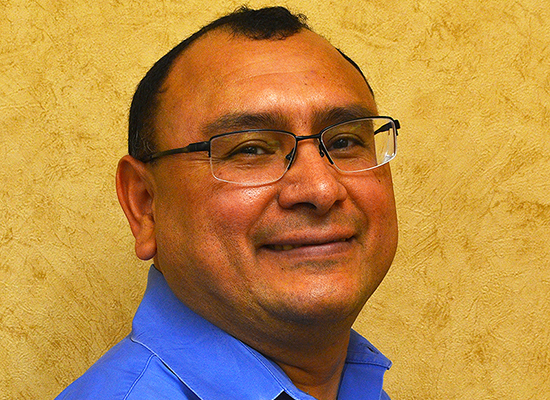
David Martinez honored for his dedication to supporting Illinois children with special healthcare needs and their families
David Martinez is the 2022 recipient of the Merit Award from the University of Illinois Chicago’s Division of Specialized Care for Children (DSCC).
The award recognizes exceptional employees for outstanding dedication and service to Illinois children with special healthcare needs and their families.
David is a Care Coordinator in the Chicago Central Office. In this role, he helps families develop personalized care plans for their children’s unique needs and connects them to the right services and resources.
“David has a remarkable ability to partner with our participant families and empower them to help reach their full potential,” DSCC Executive Director Thomas F. Jerkovitz said. “He works with families from a variety of cultural backgrounds and helps them feel understood and able to navigate the systems involved in their child’s care.”
David’s Chicago teammates say he has a talent for helping families and working “magic” in situations where others might not see a way.
“He is culturally sensitive, proactive and able to put himself in other people’s shoes so that he can better understand their situation and how best to partner with them to find a solution,” said Assistant Director of Research and Practice Initiative and former Chicago Central Regional Manager Patricia Perez.
David is a licensed clinical social worker. He grew up in El Salvador and studied criminal justice after coming to the United States.
He provided substance abuse programs at the Cook County Jail before deciding to pursue social work. This decision stemmed from his desire to help others and make an impact on families as early as possible.
David worked in mental health before joining DSCC in April 2016. He says he is honored to work for DSCC and with his amazing colleagues and managers in the Chicago Central office.
“Building strong relationships with my co-workers and the families we serve energizes me every single day,” David said. “Our families’ needs go beyond just medical. Every day is an opportunity to look at a situation from all different aspects and find a solution that can meet their needs. Sometimes it’s as simple as just listening.”
David said his DSCC career has helped him learn about many different cultures and that care coordination is not one-size-fits-all.
“Meeting the family where they are – that’s my starting point,” David said. “When I’m meeting with families, I tell them we are a team.”
David has helped achieve many successful outcomes for his participant families. In early 2022, he secured a $36,000 grant through the Guaranteed Rate Foundation to purchase and install a vehicle wheelchair lift in a participant family’s van and to make their bathroom wheelchair accessible.
But David says his proudest achievements are the relationships he builds with families.
“It would be impossible for me to deliver my passion in social work without having a relationship with families and open communication,” David said. “To be able to talk to families on a monthly basis and help them navigate through issues in life, that is my biggest accomplishment — having the trust the families place in me and DSCC.”
Our DSCC team nominated a total of 12 of our colleagues for this year’s Merit Award. As the winner, David receives a Merit Award memento, a $2,500 award and recognition from the Executive Director.
The other 2022 nominees are:
- Melissa Croft, Home Care Enrollment Specialist, Lombard Regional Office
- Christina “Tina” Glim, Care Coordinator, Mokena Regional Office
- Kristin Grubb, Administrative Aide, Peoria Regional Office
- Becky Helmink, Program Coordinator Assistant, Olney Regional Office
- Paula Holaday, Home Care Quality Improvement Specialist, Peoria Regional Office
- Marlo Johnson, Human Resources Officer, Central Administrative Office in Springfield
- Amy Jones, Regional Manager, Olney and Marion Regional Offices
- Danielle Osburn, Home Care Claims Process Lead, Central Administrative Office in Springfield
- Elma Saladar, Care Coordinator, Chicago Central
- Cindy Saxsma, Administrative Aide, Central Administrative Office in Springfield
- Katherine Serrano, Care Coordinator, Chicago Core
Congratulations, David! And a big thank you to all the nominees for their excellence on behalf of our participants and their families!
Sensory-Friendly Holiday Events Happening Across Illinois

Events feature sensitive Santa, holiday lights, craft activities and more!
Are you looking for sensory-friendly events that the whole family can enjoy this holiday season?
There are a number of sensitive Santa opportunities, festivals and other holiday activities going on across Illinois.
Our Special Events page includes a roundup of opportunities designed specifically for youth with disabilities and special healthcare needs.
Here’s a look at some of the special programs available and other event guides for parts of the state:
- The Secret Sleigh Project coordinates volunteers to provide in-home Santa visits to children who are medically fragile nationwide. See our Secret Sleigh event listing for more details on how to request a visit.
- The National Federation of the Blind is offering letters from Santa and winter celebration letters in Braille to children who are blind or have low vision. The program is for children 10 years old and younger. Please complete the letter request form by Dec. 17. Letters are available in English or Spanish. If you have any questions, call (410) 659-9314, ext. 2236, or email education@nfb.org.
- The Santa Cares program from Autism Speaks and Cherry Hill Programs provides sensory-friendly Santa experiences in Illinois and the St. Louis area on Dec. 4. These visits are free. Keepsake photo packages will be available for purchase. Reservations are required. Visit the Santa Cares website for a complete list of Santa’s stops. Be sure to select “Santa Cares”, “Caring Santa” or “Sensitive Santa” when checking your location. (Note some event dates may vary. Please check your location to confirm your date and time.)
- For families in the Chicagoland area, Chicago Parent magazine provides a list that includes opportunities to visit with Santa and other events tailored to the needs of children with disabilities.
- In central Illinois, check out this list from ChambanaMoms.com for events within driving distance of the Champaign-Urbana area or this list of seasonal light displays and events from the Mahomet Daily.
- SpringfieldMoms.org’s seasonal guide provides a roundup of activities happening in the capital city area.
- Southern Illinois residents can find many fun, seasonal activities on SI Families’ event calendar. It’s packed with ideas including a drive-thru Santa event in Marion, the Lights Fantastic Parade in Carbondale and even a “Home Alone” drive-in movie event at Murphysboro High School.
- The animals at the Lincoln Park Zoo, St. Louis Zoo, and other zoos throughout Illinois are celebrating the season, too! Contact your local zoo to find out what’s happening and when.
Be sure to check our Special Events page often as we add more holiday activities to the list. If you know of a good sensory-friendly event to share, please email us at dscc@uic.edu.
Happy Holidays!
Please note, the University of Illinois Chicago’s Division of Specialized Care for Children (DSCC) is not involved in the organizing or scheduling of these holiday events. If you have questions about a specific event, please contact the event sponsor or organizer.
Share Your Feedback on the Nursing Allocation Process
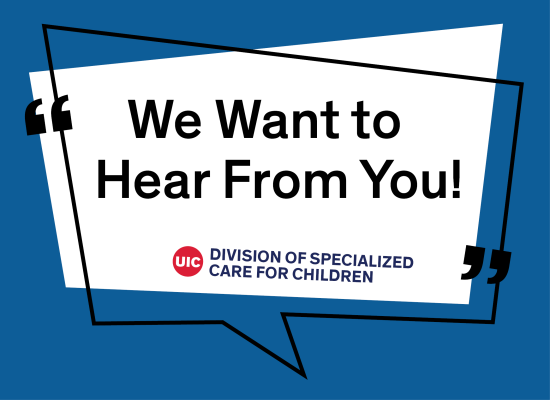
Help our Family Advisory Council recommend changes that can benefit Home Care Program participants and their families.
The Division of Specialized Care for Children (DSCC) helps coordinate and monitor in-home nursing for families through the Home Care Program.
The Illinois Department of Healthcare and Family Services (HFS) determines the number of approved nursing hours after reviewing the individual’s medical reports and medical needs.
Our Family Advisory Council (FAC) now wants to help families better understand the process for how HFS assigns nursing allocations. The FAC also wants to help HFS understand the unique needs and circumstances of Home Care families when deciding nursing allocations.
FAC Advocacy Chair Whitney Woodring is putting together a Nursing Allocation Workgroup to gather feedback on these issues. Whitney’s daughter Willa has received Home Care services since she was a baby. (See Willa’s Family Story for more details.)
Whitney hopes to speak with families across Illinois to learn about their experiences with nursing allocations and the appeal process.
You can email Whitney directly with feedback at w.woodring25@gmail.com.
Whitney would like to hear all input, including positive experiences with the process.
Your feedback will help Whitney and the FAC make recommendations for changes that can benefit as many participants as possible.
To learn more about the FAC, visit our Family Advisory Council page. Be sure to also join the FAC’s next open forum meeting on Nov. 10.
Need more information about nursing services and allocations?
Our Nursing Services Tip sheet gives an overview of Medicaid’s nursing services to help families in the Home Care Program take care of their child’s medical needs:
Our Home Care Appeal and Peer-to-Peer Review Tip Sheet explains how the review and determination of medical eligibility for Home Care services work:
- Appeal and Peer-to-Peer Review Tip Sheet in English
- Appeal and Peer-to-Peer Review Tip Sheet in Spanish
You can find these handouts and other helpful information for families on our Home Care Information Hub.
Medicaid Members – Update Your Address

Don’t risk missing important paperwork and losing Medicaid coverage
Do you get health insurance through Medicaid?
Be sure your address is up-to-date so you don’t risk losing coverage.
The Illinois Department of Healthcare and Family Services (HFS) needs every Medicaid member to update their mailing address. This step can ensure you receive important paperwork about your benefits.
Medicaid pays for your health care, like visits to your doctor and your medicine. Updating your address can help you avoid surprises and get critical information about your insurance.
We urge all Division of Specialized Care for Children (DSCC) participant families who receive Medicaid to make sure their contact information is current.
You can update your address in several easy steps:
- Call the HFS hotline at (877) 805-5312 from 7:45 a.m. to 4:30 p.m. Monday through Friday
- Contact HFS via TTY at (877) 204-1012
- Fill out a quick online form at medicaid.illinois.gov.
To keep your Medicaid coverage, be sure to use an address where mail can always reach you.
For instructions in other languages, please visit HFS’ Address Update Messaging Toolkit webpage.
It’s been two years since HFS has asked Medicaid members to update their contact information. As the COVID-19 public health emergency continues, Medicaid members can stay insured without confirming all eligibility requirements.
Plans are underway to eventually end the public health emergency. An exact date is not yet known.
Once the date is set, HFS will mail important information about how to keep your Medicaid coverage.
Please update your address right away. The process is fast, easy and free.
We will share more details about the end of the public health emergency once they are available.
If you have questions or concerns, please contact your DSCC Care Coordinator. You can call our offices at (800) 322-3722.


